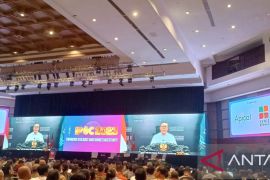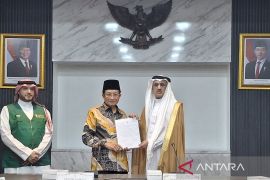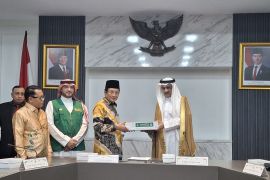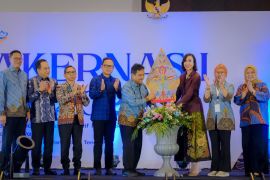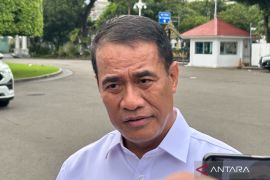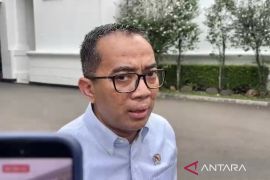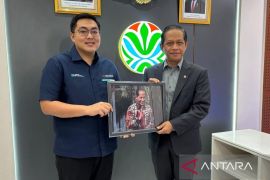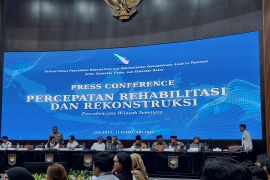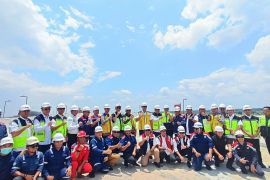Hence, the government is launching a replanting program to rejuvenate old palm trees, as some of its 11.9 million hectares of plantation are already old.
Bambang, Director General of Plantation of the Ministry of Agriculture, said that the palm oil replanting program could generate a value-added productivity of Rp125 trillion per year.
According to him, of the total 11.9 million hectares of oil palm plantations in Indonesia, about 4.7 million or 48 percent are peoples plantations. A total of 2.4 million hectares among the peoples palm estates are still managed in a traditional way, so their productivity is not maximal.
The rejuvenation program for the farmers oil palm plantations is believed to increase productivity and bring more prosperity to the people, with the full support of the government and the business community.
"The willingness of President Joko Widodo (Jokowi) to mark this replanting program is proof of the government's support for the oil palm sector," said Rino Afrino, deputy secretary general of the Indonesian Palm Oil Association (Apkasindo), on the sidelines of the World Plantation Conference and Exhibition in Jakarta, Thursday (Oct 19).
The community is increasingly motivated to plant oil palm after President Jokowis presence in Musi Banyuasin District last week to plant the countrys flagship replanting program, he added.
According to him, the developments in the oil palm sector affect the lives of 22 million people, reflecting the huge impact of oil palm on economic development, especially employment, poverty alleviation and reduction of inequality in Indonesia.
The government support is also visible in the hard work of the Ministry of Agriculture, the Ministry of Commerce, the Ministry of Industry and the Ministry of Foreign Affairs to advance the palm oil industry through various national and global forums.
"The commitment of the Jokowi government is very clear and needs to be appreciated through the hard work and struggle of oil palm stakeholders in various forums," Rino noted.
President Jokowi inaugurated the start of the countrys palm oil plantation rejuvenation program on thousands of hectares of oil palm plantations in Musi Banyuasin District, South Sumatra, last week, October 13.
The inauguration of the oil palm rejuvenation program was marked by the presentation of oil palm seedlings to farmers from the Minister of Agriculture and the first planting of the seedlings for the rejuvenation in Panca Tunggal Village, Sungai Lilin, Musi Banyuasin.
According to President Jokowi, the oil palm plantations were rejuvenated so that they would become more productive. With the rejuvenated palms, 8 tons of crude palm oil (CPO) per hectare can be produced, he remarked.
Wayan Supadno, Head of Indonesia Farmers Forum (Fortani), expects that opportunities should be used by college graduates to return to the village to plant oil palm.
"The government needs to encourage university graduates, especially from the faculty of agriculture, to become young entrepreneurs," he remarked.
Wayan, a palm oil farmer from Pangkalan Bun, Central Kalimantan, said that the involvement of young educated entrepreneurs would accelerate the growth of the national palm oil industry.
"If the palm farmers are educated, it will not be easy for the industry to be interrupted by the interests of certain groups, such as non-governmental organizations (NGOs)," he stated.
Firman Subagyo, Member of Commission IV of the House of Representatives, affirmed that the Jokowi government recognized the importance of protecting strategic commodities, such as palm oil, from various trade barriers and negative campaigns.
Referring to history, he added, the developed industrial countries in the world generally protect their strategic commodities.
The United States, for example, has been protecting four strategic commodities such as wheat, cotton, soybean and corn since hundreds of years ago.
"The US governments protection is not just limited to trade barriers, but also it ensures the availability of adequate land and subsidies for large-scale farmers," he observed.
Previous data have indicated that Indonesia is estimated to have 11.6 million hectares of palm oil plantation. Of the total, some eight percent are managed by state companies, 49 percent by private CPO industries, and 43 percent belong to small farmers. The livelihood of about 16-20 million people depends on upstream and downstream palm oil businesses across Indonesia.
In 2016, Indonesia produced over 35 million tons of crude palm oil, and 25 million tons were exported worldwide, mainly to India, China, Pakistan, and the Netherlands, bringing in US$17.8 billion in revenue, or about an eighth of the countrys total export proceeds.
At the end of 2015, palm oil fruit production fell due to the El Nino-induced drought. Exports fell two percent by volume, as production dropped by seven percent, according to the BPDP.
In the same year, Indonesias CPO production accounted for 32.5 million tons, with exports reaching 26.4 million tons. The export value went down from US$21.1 billion in 2014 to $18.6 billion in 2015.
Indonesias exports of CPO and its derivatives fell by five percent to 25.1 million tons in 2016, from 26.4 million tons in 2015. However, its production also dropped 35 million tons in 2016, from 35.5 million tons in the previous year.(*)
Reporter: Andi Abdussalam
Editor: Heru Purwanto
Copyright © ANTARA 2017
